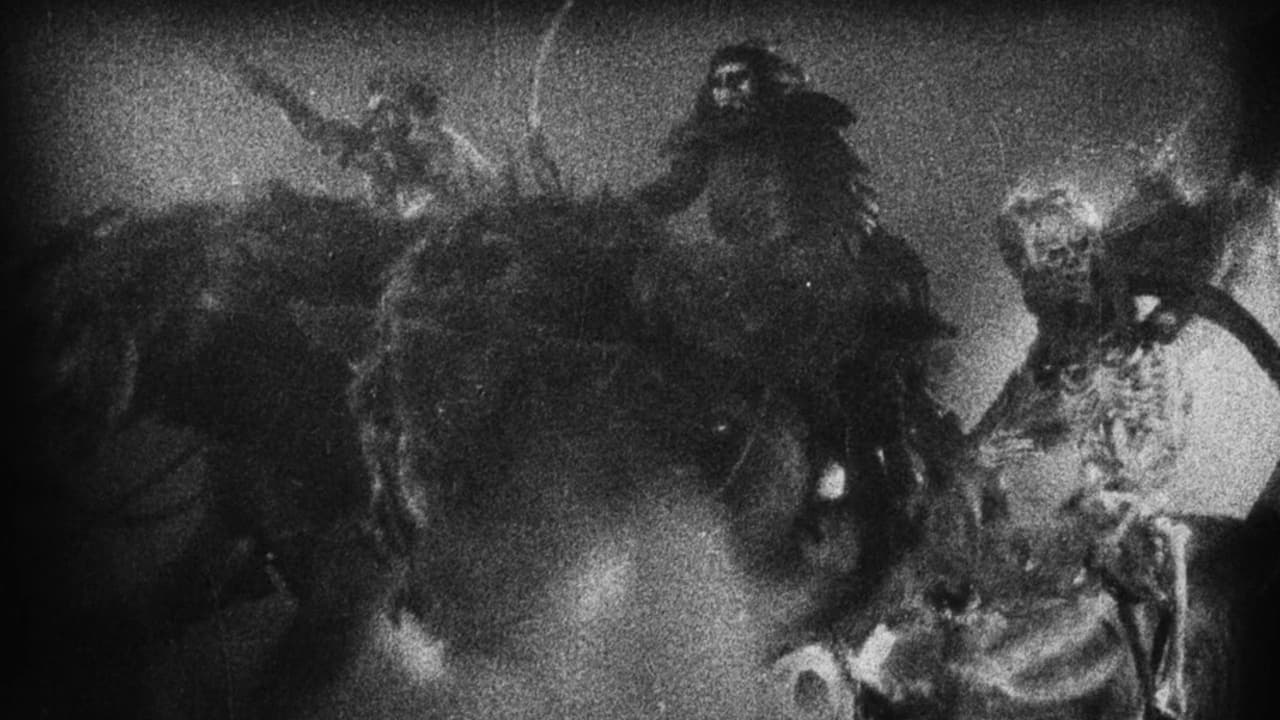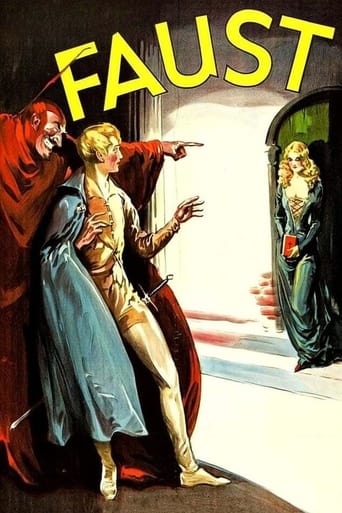

Let's be realistic.
... View MoreFantastic!
... View MoreThe best films of this genre always show a path and provide a takeaway for being a better person.
... View MoreActress is magnificent and exudes a hypnotic screen presence in this affecting drama.
... View MoreI just watched the F. W. Murnau silent film version of Faust from 1926 and it was surprisingly good. It's from the director of Nosferatu and heavily based on the Goethe version of the Faust legend, not the Christopher Marlowe verison.Marlowe's Faust ends in a bleak and very hopeless kind of way whereas Goethe has Faust redeemed at the end with the idea that caring about others and love is the most powerful and most transcendent force in the universe and that, as it is the ultimate goodness, you cannot be damned if you can love.This silent film is heavily based on the more hopeful version of the story by Goethe, containing elements of both part 1 and part 2 of Goethe's Faust. I strongly recommend this for anyone who is a fan of Goethe's version of Faust. I sort of wish it would get a remake, still set in the fifeenth / sixteenth century and with the same ending (even if people do find the idea of love redeeming you to be saccharine). I think we need stories like this. And it is a shame the Goethe version of Faust isn't more well known in the English speaking world.
... View MoreFriedrich Wilhelm Murnau was the most important director of the German expressionism era. He made 22 films from which only 11 have persisted. Murnau often made several different versions of his films, which made it impossible to tell which was the original one. Faust was no exception; he made 9 different versions of it whose editing, rhythm and acting differ from each other. F.W. Murnau did a lot of breakthroughs in cinema - he's the most influential filmmaker of his time. For instance in his earlier film Der Letzte Mann (1924, The Last Laugh) Murnau used the camera as a character for the very first time. It was the first time the audience couldn't tell when you were watching the events as an outsider and when as a character. Faust is no lesser. Eric Rohmer has written about it in his dissertation and Herman G. Weinberg saw Faust as the most beautiful film ever made.Everybody knows the German writer Goethe who wrote Faust. But the story did live before his play. It lived as a folktale. And this is where the critics did wrong. They thought that Murnau's Faust was a fiasco; probably because they tried to compare it to the original play. But F.W. Murnau did Faust (1926) based on the folktale. So the philosophy of Goethe's Faust was left away. The production company (UFA) of Faust also produced another artistic film, Metropolis by Fritz Lang. When the audience didn't like either of these films the company failed.Faust is a story about God and Satan who wager. A man, Faust, agrees to sell his soul to Satan so he can have all the power of the world. First he wants to use the power to help the diseased people but the temptations of eternal youth and beauty win. "Damned be the illusion of youth!" Faust is a timeless story because the idea of selling one's soul will always be there. Faustic contracts are still made. There is only one thing that can terminate the contract. Liebe - Love. The flaming word appears on the screen to assure us. Earlier I mentioned the new camera-work of The Last Laugh. But Faust did something new too. It was the first film that was based on the metaphorical force of light and shadow. The use of shadows in Faust is symbolic and brilliant. When talking about light and Murnau one might be reminded of Nosferatu (1922), a Gothic vampire story by F.W. Murnau, where the beams of light killed Nosferatu.Faust deals with essential and timeless themes. On the surface the themes are good and evil but Faust is much more complex than that. I would recommend this masterpiece of the German Expressionism to all film lovers. I wouldn't be surprised if one said that Faust is the best film ever made. F.w. Murnau manages to capture real humane emotions.
... View MoreYou will never see cinematography like this in a sound or color film! Murnau's 'Nosferatu' (1925) pales in comparison to this visually fantastic masterpiece!The first half is a perfect supernatural tale of God and the Devil (Mephisto) wagering over the soul of man: if Mephisto can win Faust, all of Earth belongs to Satan. It is shown and told with such amazing photography, sets and acting. Check out the other reviews that describe the wonderment of all its stunning shots in detail. The final scenes are masterful as well: the death of Gretchen's baby and Faust's final salvation.Emil Jannings is so great as Mephisto it looks like the Devil is a sure winner. He steals every scene he's in, whether he's pure evil, puckish, Satanic or clownish. "The Snake Has All The Lines!" No wonder he was the first actor to receive a Best Actor Oscar! It made me want to see his other classic, 'The Last Laugh' (1924).The musical soundtrack perfectly matches the action and mood of every scene. Great!But---the middle really drags on too long as a love story between the now young and handsome Faust and the beautiful Gretchen, and there are some needless scenes of Mephisto being pestered by Marguerite's aunt seeking to be his wife.The movie picks up again in the last third as Gretchen is condemned for her affair with Faust, who sacrifices himself for her, and Mephisto loses the bet.The film is so staggeringly made we can forgive the boring middle parts, but I can only give it a 9, not a 10.
... View MoreTo fans of early horror, director F.W. Murnau is best known for 'Nosferatu, eine Symphonie des Grauens,' his chilling 1922 vampire film, inspired by Bram Stoker's famous novel. However, his equally impressive 'Faust' is often overlooked, despite some remarkable visuals, solid acting, a truly sinister villain, and an epic tale of love, loss and evil. The story concerns Faust (Gösta Ekman), an old and disheartened alchemist who forms a pact with Satan's evil demon, Mephisto (Emil Jannings). As God and the Devil wage a war over Earth, the two opposing powers reach a tentative agreement: the entire fate of Mankind will rest on the soul of Faust, who must redeem himself from his selfish deeds before the story is complete.Relying very heavily on visuals, 'Faust' contains some truly stunning on screen imagery, most memorably the inspired shot of Mephisto towering ominously over a town, preparing to sow the seeds of the Black Death. A combination of clever optical trickery and vibrant costumes and sets makes the film an absolute delight to watch, with Murnau employing every known element fire, wind, smoke, lightning to help produce the film's dark tone. Double exposure, in which a piece of film is exposed twice to two different images, is used extremely effectively, being an integral component in many of the visual effects shots. In fact, aside perhaps from Victor Sjöström's 'Körkarlen (1921),' I can't remember double exposure being used to such remarkable effect.It's often difficult to judge performances in a silent film, but I've certainly got a generally positive attitude towards the acting in 'Faust.' I was particularly astonished by Gösta Ekman, whose character, given limitless evil control, is transformed from a withering old man to a handsome youth. Despite my impression that two different actors had been used, it seems that Ekman convincingly portrayed both the old and young man, which is a credit to both the actor and Murnau's make-up department (namely, Waldemar Jabs). Emil Jannings plays Mephisto with a sort of mysterious slyness, always one step ahead and always up to no good. Whilst I wasn't completely blown away by young actress Camilla Horn as Gretchen the woman with whom Faust falls in love her acting is adequate enough, and she certainly shows some very raw emotion in the scene's final act, when her forbidden romance with Faust sends her life in a downward spiral.'Faust' was F.W. Murnau's final film in Germany, his next project being the acclaimed American romance, 'Sunrise: A Song of Two Humans (1927).' At the time, the film was the most expensive ever made by the German studio, UFA (Universum Film AG), though it would be surpassed the following year by Fritz Lang's classic science-fiction epic, 'Metropolis.' Notably, there were five substantially different versions of 'Faust' produced, several of these by the director himself: these include a German original version, a French version, a late German version, a bilingual version for European audiences, and an American cut compiled by Murnau especially for MGM in July 1926. Each of these altered particular scenes and camera angles, and often included material that would be more relevant to the target cultural audience (for example, the US version reportedly contains a joke about the American Prohibition era).At the heart of 'Faust' is a love story between the corrupted title character and his doomed love, Gretchen. I felt that the scenes when Faust is trying to coax Gretchen into loving him were the slowest parts of the film, much less exciting and invigorating than the darker and more effects-driven sequences that preceded and followed it. Nevertheless, F.W. Murnau's 'Faust' is an absolute gem of 1920s silent horror, and anybody who doesn't look out for it is very surely missing out on something special.
... View More